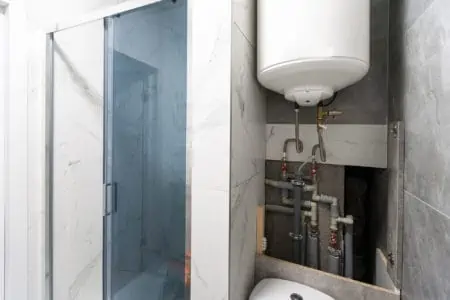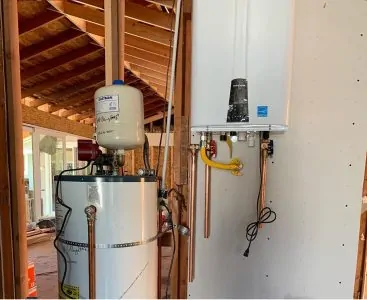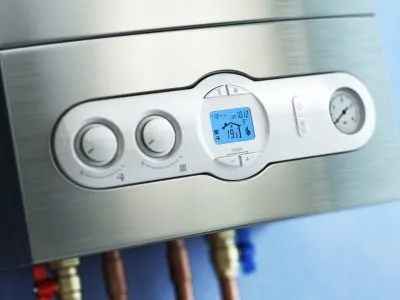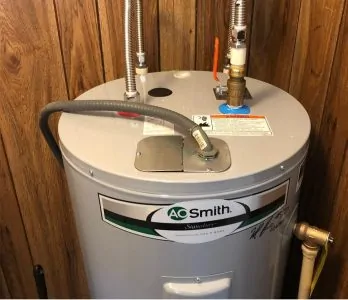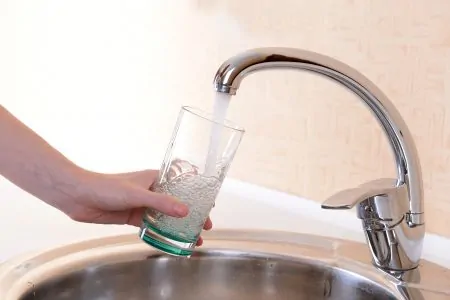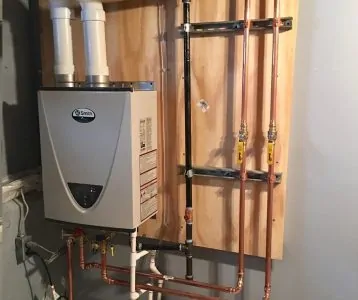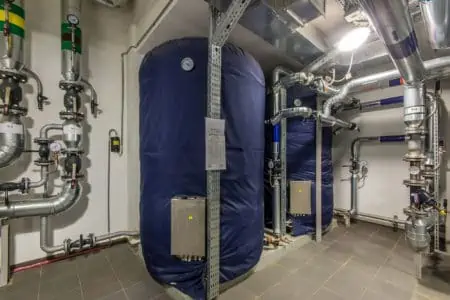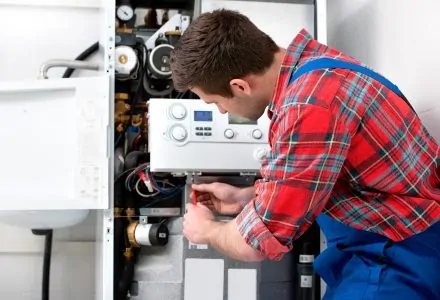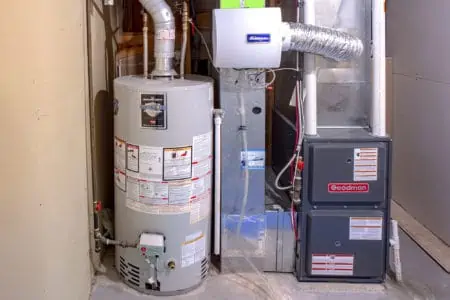Water heater ready to retire and worried about water heater costs? Unfortunately, it goes beyond just replacing the unit. There are so many potential factors, and they all play a role in the project’s final price.
So, how much is a water heater, anyway? We’ll help you understand what to expect and how much to budget. We’ll take you through water heater prices of different models and other important information to consider.
Key Takeaways
- Average water heater replacement cost is $1,200, including the new unit and labor costs.
- Factors affecting the cost include the type of water heater, capacity, venting system, and location.
- Additional costs may include permits, warranties, expansion tanks, and plumbing or carpentry work.
- Water heaters typically last 8 to 12 years, and proper maintenance can extend their lifespan.
- How Much Is a New Water Heater?
- Factors Affecting Water Heater Cost
- Additional Water Heater Replacement Costs
- Cost of Different Types of Water Heaters
- How Many Years Does a Water Heater Last?
- How Can You Save Money on Water Heater Replacement?
- Can You Replace a Water Heater Yourself?
- What To Consider When Buying a Water Heater
- What Size Water Tank Do I Need for My House?
- FAQs
- Heat it Up?
How Much Is a New Water Heater?
The average cost of replacing a water heater is $1,200, which includes the cost of the new unit and labor costs. But a bargain-hunter can get the job done for less than $900.
Highly customized systems can cost upward of $10,000. This depends on the type of water heater used, the location of the installation, and a variety of other factors.
Factors Affecting Water Heater Cost
I know, you’re still asking yourself, “how much does it cost to replace a water heater?”. But the answer isn’t that straightforward. I’ve broken down the costs into several factors that influence the cost.
Tank vs. Tankless Water Heater
Tankless water heaters are significantly more expensive than their tank-based equivalents, with average expenditures ranging from $1000 to $3000. Compared to the cost of traditional tank heaters, which ranges from $800 to $1500, this is quite the jump.
But, if you consider that tankless heaters use 70% less energy than their tank counterparts, this investment could pay off in the long run.
Gas vs. Electric Water Heater
If you want to install a tankless water heater powered by propane or natural gas, expect it to cost between $1,000 and $1,500. If your home is located near a natural gas line, it will be quite straightforward for you to connect to the existing lines and use natural gas.
The installation of an electric water heater typically costs between $800 and $1,500 on average. The lower price is because the installation is considerably simpler than a gas heater installation.
Keep In Mind
Lengthy heating times and higher electricity bills are two of the most prevalent complaints regarding electric-powered heaters.
Capacity of Water Heater
Depending on the manufacturer, most water heaters have a 40 to 60-gallon capacity. And some modern models are engineered to store even more water than before. But best believe that the water heater’s capacity will influence the end cost.
To determine the capacity you need, you must consider the peak water usage, also known as the maximum water usage in the household at a given time.
For instance, families that use 40 gallons of water during peak usage could benefit from a 50-gallon heater. Those who use 30 gallons during peak hours can do with a 40-gallon heater.
The metric you should look at for tankless water heaters is the GPM (gallons-per-minute) rating. This number provides an accurate measurement of how much water the tank can deliver over a specified length of time, such as a day.
Venting System
If you replace your electric water heater with a direct vent gas water heater, it’s wise to budget an additional $500 to $1,000 to install the vent pipe.
A vent pipe or system is recommended with gas units to revert any gasses back outside.
Power venting units cost $300 to $600 more to install compared to direct vent units. Additional wiring and electrical work costs range from $300 to $500.
Location of Tank
The size of the space where the heater will be installed can increase installation costs because it impacts the amount of labor required by the contractor.
Tanks in easily accessible areas will typically cost less than tanks that need to be transported through narrow passageways or attics. Similarly, the cost will increase if you want the unit to be located away from the main water lines, such as in a barn or shed.
The location of a unit impacts how you should position it. A gas-powered heater used in a garage must be elevated at least 18 inches above the ground. This means you’ll need a larger base to accommodate it.
Geographic Location
Depending on where you live, you might pay more for a water heater. You also have to consider potential shipping costs, gas or electricity costs, and transportation costs.
Additional Water Heater Replacement Costs
Hot water heater replacement costs will depend on permits needed, warranty, or tank removal.
Installation Cost
The cost to install a new water heater depends on the average costs for labor in your area. Costs can be as low as $150 and as high as $800.
Permits
Replacing a water heater typically necessitates a plumbing permit. Permit charges can range from $50 to $500 depending on the project’s specifics and can go as high as $1,500.
Water Heater Warranty
Water heaters come with warranties that range from eight to 12 years (some models even have lifetime warranties). Some stores or brands will offer an extended warranty which might cost you extra.
Expansion Tanks
An expansion tank is a safety measure to keep pipes from exploding during a water heater tank failure. It can cost anything from $40 to $350 to install.
Tank Removal or Relocation
The old tank must be removed before the new one can be installed. Experienced contractors would charge between $100 and $500 for the removal of a tank that is too large or difficult to access.
Plumbing Replacement
You might have to do some extra plumbing work to install a new water heater in certain situations. This will cost you extra, depending on what exactly it is that you must replace or add.
Carpentry Work
Installing or replacing a water heater might require a little bit of carpentry work. For example, drywall installation can cost anything between $500 and $700.
Converting Fuel Type
If you switch from an electric to a gas heater (or vice-versa), it will cost you more. You might need to do some electrical work or add some gas lines and connect them to the heater. Hire a professional if this is needed.
Cost of Different Types of Water Heaters
The costs for a water heater will also depend on the type of heater chosen.
Solar
There are two types of solar water tanks: active and passive. A passive system employs natural convection to circulate water throughout the home, whereas an active system uses a pump.
A passive system costs roughly $2,000, whereas an active system costs around $3,000. The additional expense is due to manpower and the need for a backup heater.
Indirect
These heaters use an existing furnace or a boiler as their energy source. An indirect water heater has a cheaper monthly cost.
But the initial purchase and installation costs are higher than those of standard heaters. The cost of an indirect water heater ranged from $1,500 to $2,000.
Hybrid Heat Pump
Hybrid heat pump water heaters are huge and bulky, making them unsuitable for compact settings. They require seven feet of clearance to operate properly. Materials and installation range from approximately $1,200 to $3,500 on average.
Gas
A 50-gallon gas heater costs roughly $1000-1500 with installation. These heaters are less expensive to run than electric models.
Electric
An electric tank costs less than a gas tank to buy and install, with a 50-gallon tank costing roughly $1200 with installation. However, the monthly operating cost tends to be more than a gas heater. This heat source is less likely to leak or burn as opposed to gas.
| Heater Type | Average Installation Cost (Excluding Materials) |
| Solar | $2,000 – $3,000 |
| Indirect | $1,500 |
| Hybrid Heat Pump | $1,200 – $3,500 |
| Gas | $500 |
| Electric | $700 |
How Many Years Does a Water Heater Last?
A water heater has an average lifespan of eight to 12 years if used according to the manufacturer’s recommendations. Installation quality, maintenance frequency, and water quality all play a role in how long that lasts.
Any water heater that’s more than 10 years old, has leaks around the tank’s base, or is malfunctioning should be replaced. To save money on your utility bills, you can also upgrade to a more energy-efficient model.
How Can You Save Money on Water Heater Replacement?
When considering any of these tips, talk with a professional to get a second opinion. What works for some doesn’t work for all.
Consider a Repair
Providing your heater is not leaking, rusted, or otherwise damaged, a good tune-up or repair can help avoid a replacement for several years. Especially if yours is still relatively new on the market.
Stick with the Configuration
The most cost-effective solution is to replace an existing water heater with one of the same type and fuel source. This will be a storage water heater for most houses. Expensive retrofitting may be required when changing the fuel source or type of heater.
Consider a Tankless or a Hybrid
These two types of heaters might cost you more initially. But they are reliable enough to save energy and money in the long haul.
Can You Replace a Water Heater Yourself?
Installing a water heater by yourself is easy if you don’t have to make dangerous modifications.
If switching from an electric to a gas heater (or vice-versa), you must modify the wiring or the gas supply pipes. Those jobs can be very dangerous, so it’s best to leave them to professionals.
Otherwise, if it’s only a matter of removing the old heater and putting in the new one, it should only take you a few hours.
What To Consider When Buying a Water Heater
Before you shell out the cash, see if any of these tips apply to you.
Home & Family Size
A family of two people will require a smaller water heater than a household with five people. If two people live in your household, you can do with a 30-gallon water heater. For large households (of six or more people), you need a water heater of at least 60 gallons.
Heater Size
The size of a heater is determined by how many gallons of water it can hold and heat at once. On-demand water heaters have no tanks, but they do have a GPM rating that will show you the water flow capacity.
Energy Efficiency
No matter what fuel you use, a water heater might be the third greatest energy consumer in your home. Because of this, you should choose an energy-efficient device, if at all possible, when purchasing a new unit.
However, all new water heaters are designed to be extremely energy efficient to meet stringent Federal energy efficiency criteria. Check the unit’s Energy Factor (EF) rating to see how efficient it is.
This rating shows efficiencies in energy conversion and heat loss during storage. When it comes to water heater efficiency, a greater energy factor means a more efficient water heater.
Fuel Type
Water heaters for household use are mostly powered by gas or electricity, depending on the model. It is important to determine whether your existing tank water heater is powered by natural gas or propane if it is currently gas-fired.
Gas water heaters typically have a greater initial cost and necessitate the use of proper ventilation for the sake of health and safety. However, they can balance their initial costs over time by having lower running costs.
Electric models tend to have lower initial expenses, but they also tend to have greater operational costs over time. To obtain the right replacement, it is critical to first determine which source is being used in your home.
What Size Water Tank Do I Need for My House?
If you’re not sure what size water tank is best for your home, consider how many people live in your household. You need a water heater with a 40 to 50-gallon capacity for a family of four.
FAQs
Heat it Up?
So, although there’s no simple answer to the question of how much a water heater is, we hope we’ve given you a better idea of what to expect. Doing your homework and figuring out what kind of water heater is most suitable for your home will pay off in the long run.
